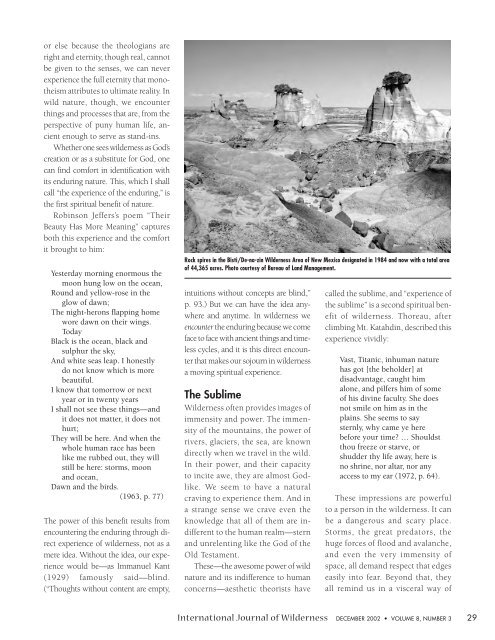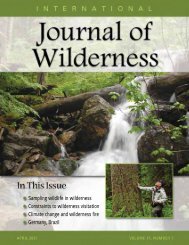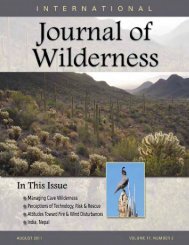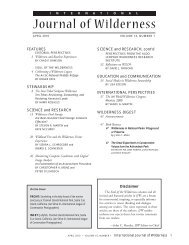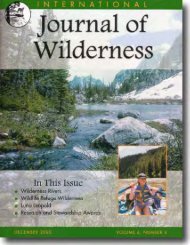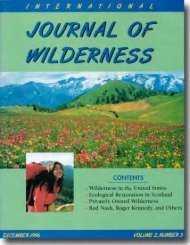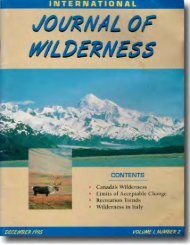Download full PDF - International Journal of Wilderness
Download full PDF - International Journal of Wilderness
Download full PDF - International Journal of Wilderness
You also want an ePaper? Increase the reach of your titles
YUMPU automatically turns print PDFs into web optimized ePapers that Google loves.
or else because the theologians are<br />
right and eternity, though real, cannot<br />
be given to the senses, we can never<br />
experience the <strong>full</strong> eternity that monotheism<br />
attributes to ultimate reality. In<br />
wild nature, though, we encounter<br />
things and processes that are, from the<br />
perspective <strong>of</strong> puny human life, ancient<br />
enough to serve as stand-ins.<br />
Whether one sees wilderness as God’s<br />
creation or as a substitute for God, one<br />
can find comfort in identification with<br />
its enduring nature. This, which I shall<br />
call “the experience <strong>of</strong> the enduring,” is<br />
the first spiritual benefit <strong>of</strong> nature.<br />
Robinson Jeffers’s poem “Their<br />
Beauty Has More Meaning” captures<br />
both this experience and the comfort<br />
it brought to him:<br />
Yesterday morning enormous the<br />
moon hung low on the ocean,<br />
Round and yellow-rose in the<br />
glow <strong>of</strong> dawn;<br />
The night-herons flapping home<br />
wore dawn on their wings.<br />
Today<br />
Black is the ocean, black and<br />
sulphur the sky,<br />
And white seas leap. I honestly<br />
do not know which is more<br />
beautiful.<br />
I know that tomorrow or next<br />
year or in twenty years<br />
I shall not see these things—and<br />
it does not matter, it does not<br />
hurt;<br />
They will be here. And when the<br />
whole human race has been<br />
like me rubbed out, they will<br />
still be here: storms, moon<br />
and ocean,<br />
Dawn and the birds.<br />
(1963, p. 77)<br />
The power <strong>of</strong> this benefit results from<br />
encountering the enduring through direct<br />
experience <strong>of</strong> wilderness, not as a<br />
mere idea. Without the idea, our experience<br />
would be—as Immanuel Kant<br />
(1929) famously said—blind.<br />
(“Thoughts without content are empty,<br />
Rock spires in the Bisti/De-na-zin <strong>Wilderness</strong> Area <strong>of</strong> New Mexico designated in 1984 and now with a total area<br />
<strong>of</strong> 44,365 acres. Photo courtesy <strong>of</strong> Bureau <strong>of</strong> Land Management.<br />
intuitions without concepts are blind,”<br />
p. 93.) But we can have the idea anywhere<br />
and anytime. In wilderness we<br />
encounter the enduring because we come<br />
face to face with ancient things and timeless<br />
cycles, and it is this direct encounter<br />
that makes our sojourn in wilderness<br />
a moving spiritual experience.<br />
The Sublime<br />
<strong>Wilderness</strong> <strong>of</strong>ten provides images <strong>of</strong><br />
immensity and power. The immensity<br />
<strong>of</strong> the mountains, the power <strong>of</strong><br />
rivers, glaciers, the sea, are known<br />
directly when we travel in the wild.<br />
In their power, and their capacity<br />
to incite awe, they are almost Godlike.<br />
We seem to have a natural<br />
craving to experience them. And in<br />
a strange sense we crave even the<br />
knowledge that all <strong>of</strong> them are indifferent<br />
to the human realm—stern<br />
and unrelenting like the God <strong>of</strong> the<br />
Old Testament.<br />
These—the awesome power <strong>of</strong> wild<br />
nature and its indifference to human<br />
concerns—aesthetic theorists have<br />
called the sublime, and “experience <strong>of</strong><br />
the sublime” is a second spiritual benefit<br />
<strong>of</strong> wilderness. Thoreau, after<br />
climbing Mt. Katahdin, described this<br />
experience vividly:<br />
Vast, Titanic, inhuman nature<br />
has got [the beholder] at<br />
disadvantage, caught him<br />
alone, and pilfers him <strong>of</strong> some<br />
<strong>of</strong> his divine faculty. She does<br />
not smile on him as in the<br />
plains. She seems to say<br />
sternly, why came ye here<br />
before your time? … Shouldst<br />
thou freeze or starve, or<br />
shudder thy life away, here is<br />
no shrine, nor altar, nor any<br />
access to my ear (1972, p. 64).<br />
These impressions are powerful<br />
to a person in the wilderness. It can<br />
be a dangerous and scary place.<br />
Storms, the great predators, the<br />
huge forces <strong>of</strong> flood and avalanche,<br />
and even the very immensity <strong>of</strong><br />
space, all demand respect that edges<br />
easily into fear. Beyond that, they<br />
all remind us in a visceral way <strong>of</strong><br />
<strong>International</strong> <strong>Journal</strong> <strong>of</strong> <strong>Wilderness</strong> DECEMBER 2002 • VOLUME 8, NUMBER 3 29


